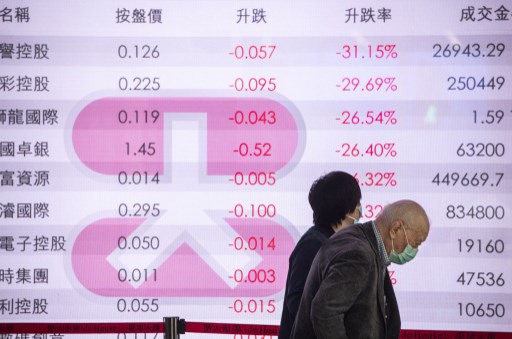Most Asian markets tumbled on Tuesday and crude prices continued to surge as the United States mulls a ban on oil imports from Russia following its invasion of Ukraine.
Gold also climbed above the key $2,000 level, as the prospect of a Russia oil ban raised concerns of soaring inflation and slowing economic growth.
President Joe Biden’s administration is willing to move ahead with a US ban on Russian oil imports – even if European allies do not, US sources indicated, while Russia warned that prices could surge to $300 a barrel and it might close the main gas pipeline to Germany if the West halts oil flows.
International oil benchmark Brent crude, which briefly hit more than $139 a barrel in the previous session, was up about 2.6% at $126.42.
Also on AF: Biden to Order Studies on Regulating Crypto and a Digital Dollar
Still, with Europe rejecting plans to ban energy imports, there was some relief and European stocks picked up more than 1% in early trading, although some analysts said that may be a temporary reprieve.
Since mid-February, European banks have lost a quarter of their share value and an earnings hit looks inevitable.
The MSCI world equity index, which tracks shares in 50 countries, was down 0.2% and has lost 10% since early February. It was down as much as 0.5% in early Asian trading, hitting its lowest level since March 2021.
An Asian stock market gauge lost 1% in afternoon trade, tracking a bruising Wall Street session with Japan and Hong Kong leading losses.
The benchmark Nikkei 225 index dropped 1.71%, or 430.46 points, to 24,790.95, while the broader Topix index gave up 1.90%, or 34.17 points, to 1,759.86.
The Hang Seng Index sank 1.39%, or 291.76 points, to 20,765.87. The Shanghai Composite Index fell 2.35%, or 79.33 points, to 3,293.53, while the Shenzhen Composite Index on China’s second exchange shed 2.89%, or 63.75 points, to 2,139.67.
Yuan Seen As Safe Harbour
China’s yuan, however, touched a one-week high with investors eying Chinese assets as a potential safe harbour amid heightened market volatility over the Ukraine crisis.
South Korea’s won eased 0.8%, the steepest decliner among regional currencies, while benchmark stock indexes in the Philippines, Taiwan and China sank more than 2% each.
“Clearly oil is in the firing line now from both sides. And there’s a little bit of brinkmanship as to who can threaten whom when it comes to oil imports or exports,” Kyle Rodda, a market analyst at IG Australia, said.
UBS Global Wealth Management is recommending a neutral stance on equities and advising clients to hold commodities, energy stocks and the US dollar as portfolio hedges in the short term.
The yield on benchmark 10-year Treasury notes rose to 1.8369% compared with its US close of 1.749% on Monday. The two-year yield, which rises with traders’ expectations of higher Fed fund rates, touched 1.5947% compared with a US close of 1.548%.
The rally in oil and other commodities prices will only add to the global inflationary pulse with data this week expected to show the US Consumer Price Index climbed a stratospheric 7.9% on a year-on-year basis in February, up from 7.5% in January.
Key figures around 0820 GMT
Tokyo – Nikkei 225 > DOWN 1.7% at 25,790.95 (close)
Hong Kong – Hang Seng Index> DOWN 1.4% at 20,765.87 (close)
Shanghai – Composite> DOWN 2.4% at 3,293.53 (close)
London – FTSE 100> DOWN 0.5% at 6,926.76
Brent North Sea crude> UP 2.4% at $126.15 per barrel
West Texas Intermediate> UP 2.0% at $121.75 per barrel
New York – Dow> DOWN 2.4% at 32,817.38 (Monday close)
- Reuters with additional editing by Sean O’Meara
























